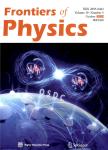Reconstructing unknown quantum states using variational layerwise method
作者机构:State Key Laboratory of Low-Dimensional Quantum Physics and Department of PhysicsTsinghua UniversityBeijing 100084China Beijing Academy of Quantum Information SciencesBeijing 100193China Frontier Science Center for Quantum InformationBeijing 100084China Beijing National Research Center for Information Science and TechnologyBeijing 100084China
出 版 物:《Frontiers of physics》 (物理学前沿(英文版))
年 卷 期:2022年第17卷第5期
页 面:137-148页
核心收录:
学科分类:07[理学] 070201[理学-理论物理] 0702[理学-物理学]
基 金:support from the National Natural Science Foundation of China 国家科技攻关计划项目 the Key Research and Development Program of Guangdong province Beijing Advanced Innovation Center for Future Chip (ICFC) 国家自然科学基金
主 题:variational quantum algorithm layerwise learning quantum state reconstructing
摘 要:In order to gain comprehensive knowledge of an arbitrary unknown quantum state,one feasible way is to reconstruct it,which can be realized by finding a series of quantum operations that can refactor the unitary evolution producing the unknown *** design an adaptive framework that can reconstruct unknown quantum states at high fidelities,which utilizes SWAP test,parameterized quantum circuits(PQCs)and layerwise learning *** conduct benchmarking on the framework using numerical simulations and reproduce states of up to six qubits at more than 96%overlaps with original states on average using PQCs trained by our framework,revealing its high applicability to quantum systems of different scales ***,we perform experiments on a five-qubit IBM Quantum hardware to reconstruct random unknown single qubit states,illustrating the practical performance of our *** a certain reconstructing fidelity,our method can effectively construct a PQC of suitable length,avoiding barren plateaus of shadow circuits and overuse of quantum resources by deep circuits,which is of much significance when the scale of the target state is large and there is no a priori information on *** advantage indicates that it can learn credible information of unknown states with limited quantum resources,giving a boost to quantum algorithms based on parameterized circuits on near-term quantum processors.



